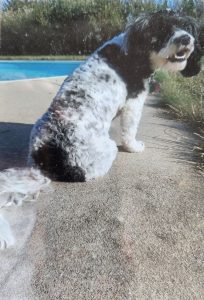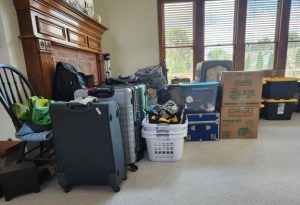This is the 16th story in a series. Click here to read all parts from the beginning.
After a while, the blue glaze of ice on the cabin’s old windows melted enough that I could see patchy clouds through the row of icicles hanging from the roof. That wasn’t much of a view because it reminded me of looking into a hungry beast’s fangs. I turned away, just as another icicle hit the ground and shattered.

Yeah, I admit I would’ve liked a tall mug of Ira’s hard cider to take my mind off having come so close to being eaten. But of course, that would not have improved my chances of survival, which already left much to be desired. So, instead, I distracted myself by doing chores for much of the day.
The first place I tackled was the wood plank floor, crusted with mud and the droppings of those furry little creatures in the rafters that resembled miniature turkeys. From the looks of it, Ira didn’t care much; but I was getting creepy thoughts that I might die of some alien disease spread by germs in mini-turkey doo. I filled a bucket with snow and set it by the fire to melt, found a slab of Ira’s harsh homemade soap and a few scraps of fur to use as cleaning rags, and got to work.
Ira, meanwhile, opened the trapdoor to the cellar and climbed down a ladder into its frigid depths, retrieving frozen fish. A quick glance showed me that wooden shelving divided the cellar into a freezer area, just above the icy dirt floor, and a refrigerator area at the top for fruits and veggies. Taking a few large potato-like tubers from a top shelf, Ira put them in a baking pan with the fish and started our dinner cooking.
The cellar looked fairly well stocked. Scrubbing away, I consoled myself with the thought that I’d have plenty to eat here, just as long as nothing ate me. Ira sat at the table and munched nuts from a bowl as he fitted a wicked-looking bone tip to a long spear. I didn’t ask what he might be planning to hunt with it. A half-dozen spears already hung from the back wall. Even though Ira had said there were no more wars, the sight still left me feeling uneasy.
The spears proved useful, however, when I finished washing the floor. I picked up the rug I’d been sleeping on, which was full of stuff I really didn’t want to think about, and took it out to the porch to beat it with a spear shaft. I figured if any wild beasts tried to get me, at least I’d be armed.
I hung the rug over the porch railing and gave it a few good blows, looking over my shoulder after each one and cursing myself for being such a coward.
“Wimp!” I shouted, giving the rug another whack. More dust and droppings flew off, darkening the half-melted snow.
Nothing came slinking out of the forest when I took another glance.
“Worthless wuss!”
With the next blow, a big clump of mud came off the rug, landed on the bottom step, and bounced into the snow. The trees barely moved in a light breeze. No beasts had shown themselves.
“Such a brave dragon slayer, HA!” I shrieked, letting the rug have the full force of my anger and frustration. This time, some fur fell off, and I came to my senses enough to comprehend that I shouldn’t be destroying my host’s rug. I gathered it up along with the spear and went back inside.
The baked fish was starting to smell pretty good. Ira, at the table, looked up from braiding a rope by hand as he gave me a curious glance. I realized he’d heard every word I said. Turning away without meeting his eyes, I fussed with the rug and spear, carefully putting them back in their places.
“Walk with me,” Ira finally said, pushing back his chair as he stood up. “The warhagalla surely will have moved on by now.”
Even if I’d wanted to refuse out of pride, I really did need to use the latrine. Picking up the big knife I’d decided to carry as a dagger, I followed Ira. I was still wearing my shoes, for all the good they did in the snowmelt; the ground was so soggy that after a few steps, my shoes were soaked through. Ira’s big, leathery bare feet padded along in a direct line to the trees, not even trying to avoid the puddles.
As he’d predicted, the warhagalla was long gone. Scavengers had carried off whatever remained of its early-morning kill, and I saw no fresh tracks. Still, I wasn’t inclined to linger, and I was glad to have Ira standing guard while I relieved myself. He set a brisk pace on the way back to the cabin without trying to start a conversation about my feelings, for which I was doubly and triply glad.
Just as we reached the front door, I heard a voice in the forest nearby, answered by another. They weren’t quite close enough for me to make out the words. Opening the door quickly, Ira stood aside to let me enter first, while he kept his gaze fixed on the trees behind us.
“Do you know them?” I asked, after he came inside and shut the door.
“No.” He spoke in a low tone, not much above a whisper. “They could be hunters tracking prey, who always pass by quickly. Or, they could be marauders, looking for homes to rob. If so, they will bang on the door, and I’ll have no choice but to open it, as otherwise they will just break the windows and rob me anyway.”
A deep bass voice sounded much closer now. I made out some words: “here,” and “this way,” followed by shouts of agreement. They clearly were approaching the cabin, which seemed to rule out any chance of a peaceful hunting party.
“You must hide.” Ira’s voice had fallen to an actual whisper now, as he motioned for me to follow him. “You are not from here. If they see you, they’ll assume we are both sorcerers, and the first thing they’ll do is try to kill us both before we have time to cast spells on them.”
As he spoke, Ira opened a large drawer under his sleeping platform and took out furs of various sizes, which he threw haphazardly on the floor as additional rugs. When he’d made enough space in the drawer, he turned back toward me, his words barely audible now.
“Get in.”










